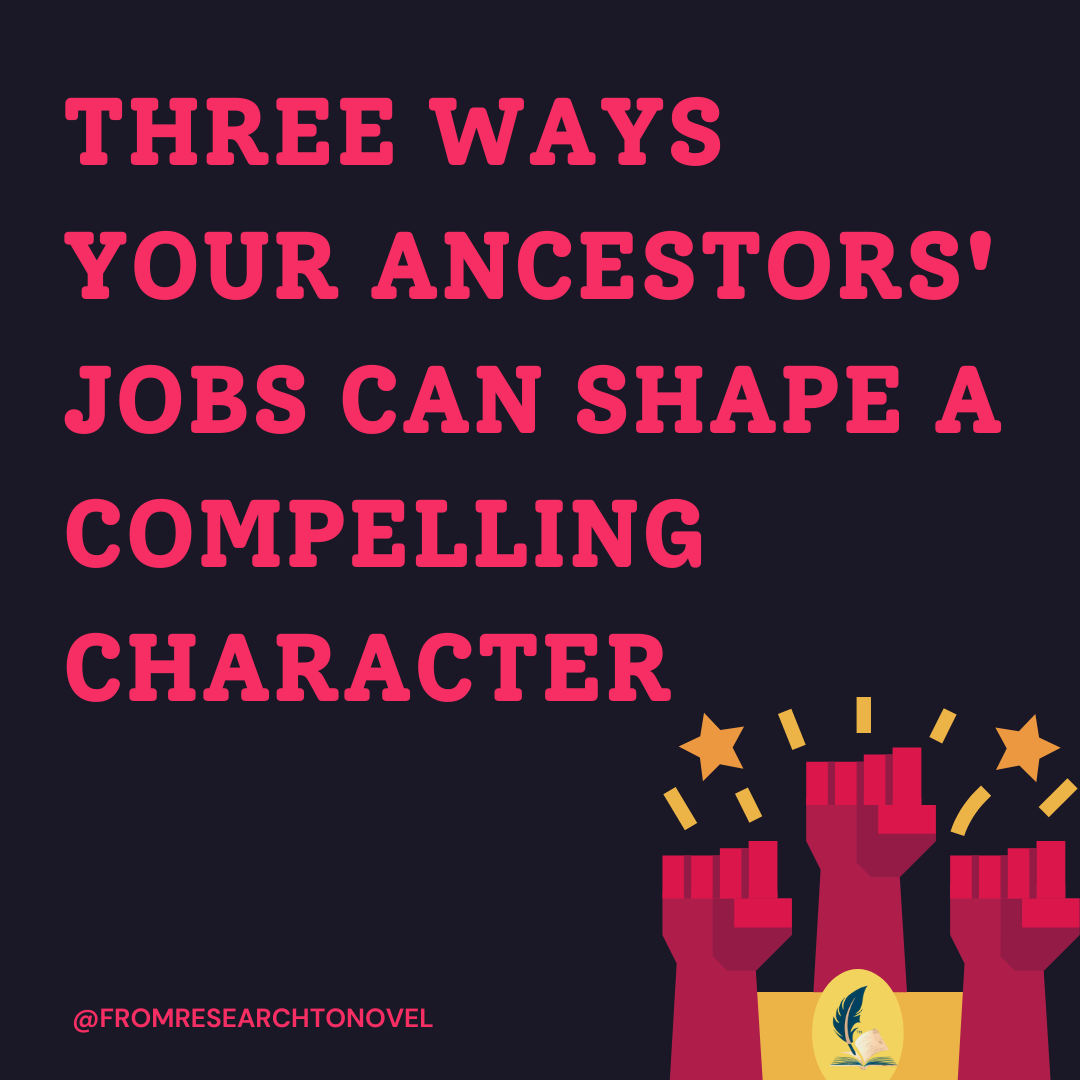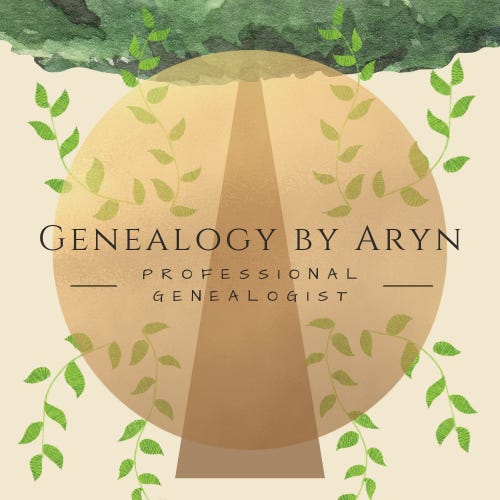Three Ways Your Ancestors' Jobs Can Shape a Compelling Character
with some known jobs and some fun ones too! + free worksheet
When developing fictional characters, creative fictional writers often look to their own families and friends for inspiration. By using Genealogical Research about our own family or other people in our lives or throughout history who inspire us, a great place to start character building are occupations. Ancestral occupations tell us a lot about a person. It is a window into their lifestyle, social class, education, and more.
Examining multiple census records can help to paint a picture of the life someone had. For example, if they had a new occupation every ten years, this may suggest economic changes, added education, or even personal problems that affected their work life. The jobs your grandparents, great-grandparents, and their predecessors performed can provide valuable material for character development for either historical fiction or creative nonfiction.
These historical professions not only offer authentic period details but also reveal much about social class, education, skills, and daily challenges that can bring depth to your characters.
Let's explore three powerful ways ancestral occupations can enhance your character development, with examples from both common and lesser-known historical professions.
Physical Traits and Mannerisms
Occupations shaped people's bodies and behaviors in distinctive ways. Through physical demands, psychosocial factors, and the development of habits and roles, a person's day to day duties in their occupation shapes them physically and mentally. These attributes would have also affected their lives outside of their jobs. So, it is important to consider how these physical characteristics might manifest in your character.
Here are some examples:
Blacksmith: Strong upper body, calloused hands, perhaps slight hearing loss from constant hammering. They might habitually stand with feet apart for balance, unconsciously mimic hammering motions when thinking, or have burn scars on their forearms.
Seamstress: Excellent close-range vision but potentially deteriorating eyesight from fine detail work. Nimble fingers, a slight hunch from bending over work, and perhaps a habit of squinting or automatically reaching to adjust nonexistent pins while conversing.
Coal Miner: Distinctive "miner's stoop" from working in low tunnels, chronic lung issues causing a particular cough, and possibly blue-black scars beneath the skin from coal dust embedding in cuts. They might instinctively duck when entering rooms or feel uncomfortable in wide, open spaces.
Acrobat: Unusual flexibility, exceptional balance, and compact musculature. Perhaps they unconsciously walk with perfect posture or use their hands to "spot" themselves when moving quickly, betraying their circus background.
Lamplighter: Developed shoulder strength from using long poles, quick climbing ability, excellent night vision, and perhaps a distinctive gait from covering long distances each evening. They might be uncomfortable sleeping in complete darkness.
Powder Monkey (child workers who carried explosives on sailing ships): Residual nervous tics from high-stress work, perhaps missing fingers, heightened startle response to loud noises, and possibly stunted growth from childhood malnutrition aboard ship.
Take time to research your ancestors' occupation. Educate yourself on what their job entailed. How would it have affected them, and how would it have influenced the world around them.
Knowledge Sets and Problem-Solving Approaches
Each historical occupation required specific expertise and shaped how a person approached challenges, in the same way modern occupations do. Education, training, and background would have come into play for your ancestors. Was it an entry level job? Did they work their way up? Did that have certain skills that made the occupation a perfect fit for the job, or were they over or under qualified? All of these aspects would have affected their thinking, how they carried themselves and the choices they made throughout their lives.
Here are some examples:
Cooper (barrel maker): Understands curved geometry intuitively, sees containers everywhere, and approaches problems with precision and measurement. They might view social situations as different "staves" needing to be properly aligned.
Midwife: Possesses emergency medical knowledge, reads body language expertly, and remains calm under pressure. They might approach any crisis with a methodical evaluation of symptoms and options.
Farmer: Thinks seasonally and cyclically rather than linearly, possesses deep weather knowledge, and approaches problems with patience, knowing some solutions need time to grow.
Resurrectionist (body snatcher for medical schools): Knowledge of cemetery layouts and burial practices, ability to work quietly under pressure, and perhaps a dark humor about mortality. They might be unnaturally comfortable with death.
Mudlark (scavenger in river mud): Sharp observational skills, knowledge of tides and currents, and an ability to spot value in what others discard. They might constantly scan the ground when walking or mentally categorize discarded items by potential value.
Phrenologist (reader of skull bumps): Observes facial features and head shapes automatically, categorizes people into "types," and might approach problems through a framework of fixed characteristics rather than changeable behaviors.
Values, Fears, and Worldviews
Occupational cultures instill particular beliefs, priorities, and anxieties that might emerge in your ancestor and the character you based on them. Rounding out your knowledge of what they did, where they worked, who they worked with and when they worked there bring a larger and more rounded experience to your ancestor or character's life.
Here are some examples how occupations may have changed values, trigger fears, or shifted worldviews:
Fisherman: Values preparation and respect for nature's power, fears deep water or specific weather patterns, and views the world through a lens of unpredictability and bounty. Perhaps they compulsively check weather patterns or refuse to whistle indoors (an old sailor's superstition).
Teacher: Values order and incremental progress, fears ignorance or chaos, and sees the world as a series of lessons. They might unconsciously test or quiz others in conversation.
Apothecary: Values precise measurement, fears contamination, and views health as a balanced system. They might notice symptoms in others before they're mentioned or instinctively categorize plants while walking outdoors.
Leech Collector: Comfort with wetlands and swamps, heightened awareness of seasonal changes in wildlife, and possibly an unusual tolerance for blood and parasites. They might view illness as something to be drawn out rather than suppressed.
Rat Catcher: Heightened awareness of small movements, comfort with night work, and perhaps values pragmatism over squeamishness. They might notice pest signs others miss and approach problems by looking for the root source rather than treating symptoms.
Town Crier: Values clear communication, fears being silenced, and sees information as power. They might speak with unusual projection and clarity or organize thoughts as though composing announcements.
Bringing Ancestral Occupations to Life in Your Characters
It is important to remember that when you are incorporating ancestral occupations into character development, you should consider:
Research thoroughly: Beyond job descriptions, discover the tools, daily routines, hazards, and social standing of the profession. Read newspapers of that time period, read books about their occupation, and search for oral histories by people who had similar jobs.
Consider intergenerational influences: Even if your character never worked in their ancestor's trade, how might values and skills have been passed down through family stories, heirlooms, or unconscious modeling? We all have baggage, and we tend to pass the baggage alone to family and friends. It is like the ripple of a pebble dropped in a still pond, the small waves will roll out.
Look for conflicts: Perhaps your character rebels against a family occupational tradition or feels the weight of expectations to continue it, or maybe they worked at a factory or a mill that went on strike to fight for better working conditions and wages. Take time to examine other family member’s occupations in the same house and to read about the local history where and when your ancestor lived to have a better understanding of the choices they made.
Explore community connections: Many historical occupations tied people to specific communities—guilds, unions, or professional networks—that might still influence your character's social connections. May local historical and genealogical societies have resources to help you better understand these networks.
By breaking down, exploring, and better understanding the occupations of your ancestors, you will be able to create characters with authentic details, distinctive traits, and complex relationships to their past. Whether your character is a modern librarian with a rat-catcher ancestor or a Victorian lady whose grandfather was a coal miner, these occupational echoes can create compelling narrative tensions and profound characters with depth and substance.
Tell me, what ancestral occupations appear in your family tree? How might they inspire your next character?
FREEBIE!!
Don’t forget to grab your copy of Ancestral Occupation Character Development Worksheet! Designed to help you better organize your research and to build out your characters.
Are you enjoying my posts? I'd love to get your thoughts to help me make the newsletter even more valuable and enjoyable for you. It'll only take a few minutes!
Don’t forget to give this post a heart and share it with a friend!
To learn more about Genealogy by Aryn - head over to GenealogybyAryn.com, stop by and say hello on Bluesky - Instagram - Facebook - YouTube
Be sure to check out my Etsy Shop and stop by my Genealogy Shop.
Looking to learn more about writing your family history? Check out From Research to Novel!
For more information about my Genealogical Services visit GenealogyByAryn.com or email me at aryn.genealogy@gmail.com. For more information on Writing Services - visit ASYounglesAuthor.com







